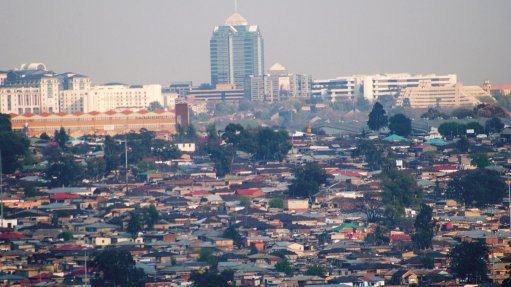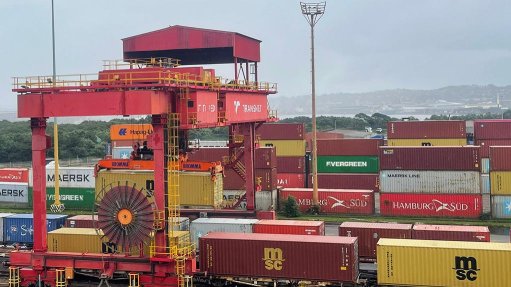Global crisis forcing Africa to ‘grow up’, develop localised solutions – panel
Despite the Covid-19 pandemic creating a “perfect storm” for African countries with rising interest rates and an increase in the risk of sovereign default, the continent’s leadership generally has “shown up” and delivered localised solutions to problems, says Standard Bank East Africa regional CE Patrick Mweheire.
Speaking during a panel discussion hosted by the bank on Building Trust after the African Polycrisis: People, Energy, Climate and Finance on March 15, he said that a lot of conversations right now would likely not have been had five years ago.
“Governments are sitting down and they are realising . . . we have got this limited fiscal space [but] we [also] have all these things we have to do. We have got to prioritise [but] we do not have access to . . . low costs or interest-free dollar funding that we used to have before,” said Mweheire.
However, he said that despite a change to the way in which fiscal and social matters were approached, recent debates on the “Africa problem” had been “very healthy”, especially in terms of African development.
As such, in realising that African countries, to a large extent, were “on our own” in terms of solving localised and unique problems, they had come up with Africa-centric solutions, said Mweheire.
“I am very encouraged. That is where I [get] my optimism that when we have these discussions with technocrats . . . sovereign leaders, business people – it is no longer [about] borrowing [or] pick[ing] a solution from Europe, because we know they are a mess as well,” he said.
The US also has various internal issues to deal with, Mweheire added, stating that this scenario had forced Africa to “sort of grow up and come up with our own solutions”, leaving him with “huge optimism” about African growth and development in the next few years.
SUPERPOWER DISRUPTION
European Institute director and Shelby Cullom Davis Chair of History at Columbia University Adam Tooze concurred with Mweheire, saying a “deeply concern[ing]” wave of debt crisis in 2020 did not transpire because emerging markets had become increasingly resilient, having “huge competence [and] considerable credibility in managing financial stress”.
However, Tooze said that was discounting “long-run pain” on the horizon, but that Africa was better prepared to handle future shocks.
He explained that the world was facing “a serious moment of crisis”, not just in Africa, but within the Group of 20 (G20) and even G30 countries. Countries like Indonesia and Malaysia were starting to see all-inclusive globalisation of decision-making and resource mobilisation capacity in a multipolar manner that was “really bewildering”.
“To conventionally-minded folks, I think the West is still getting over this shock. It is a little bit like a new 1960s, where the United Nations was suddenly transformed - the G20 was suddenly transformed.
“This is a very optimistic and dramatic moment. I personally feel [that] . . . it is a transformative moment.”
However, Tooze pointed out that considerable discussion had gone into the “drums of war” being beaten by major superpowers around the world, including Russia, the US, Australia, the UK and China.
“I am all the more concerned about it, because the flip side, the bad side of this world is extraordinarily, I think, dangerous . . . the polarisation between the powers that consider themselves to be the great players of the old, great game – the US and China.
“. . . from close contact with people in Washington, and spen[ding] a lot of time around Chinese journalists recently, every headline you read, every rumour you hear about the drums of war that are being beaten now on both sides, you should take deadly seriously,” he said.
Tooze quipped that it was “almost a relief” to be in South Africa for a couple of days and dealing primarily with people’s concerns about power utility Eskom.
Article Enquiry
Email Article
Save Article
Feedback
To advertise email advertising@creamermedia.co.za or click here
Press Office
Announcements
What's On
Subscribe to improve your user experience...
Option 1 (equivalent of R125 a month):
Receive a weekly copy of Creamer Media's Engineering News & Mining Weekly magazine
(print copy for those in South Africa and e-magazine for those outside of South Africa)
Receive daily email newsletters
Access to full search results
Access archive of magazine back copies
Access to Projects in Progress
Access to ONE Research Report of your choice in PDF format
Option 2 (equivalent of R375 a month):
All benefits from Option 1
PLUS
Access to Creamer Media's Research Channel Africa for ALL Research Reports, in PDF format, on various industrial and mining sectors
including Electricity; Water; Energy Transition; Hydrogen; Roads, Rail and Ports; Coal; Gold; Platinum; Battery Metals; etc.
Already a subscriber?
Forgotten your password?
Receive weekly copy of Creamer Media's Engineering News & Mining Weekly magazine (print copy for those in South Africa and e-magazine for those outside of South Africa)
➕
Recieve daily email newsletters
➕
Access to full search results
➕
Access archive of magazine back copies
➕
Access to Projects in Progress
➕
Access to ONE Research Report of your choice in PDF format
RESEARCH CHANNEL AFRICA
R4500 (equivalent of R375 a month)
SUBSCRIBEAll benefits from Option 1
➕
Access to Creamer Media's Research Channel Africa for ALL Research Reports on various industrial and mining sectors, in PDF format, including on:
Electricity
➕
Water
➕
Energy Transition
➕
Hydrogen
➕
Roads, Rail and Ports
➕
Coal
➕
Gold
➕
Platinum
➕
Battery Metals
➕
etc.
Receive all benefits from Option 1 or Option 2 delivered to numerous people at your company
➕
Multiple User names and Passwords for simultaneous log-ins
➕
Intranet integration access to all in your organisation

















